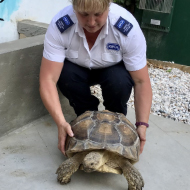
Finder hauled the enormous animal home in a wheelbarrow
Pet owners are being reminded to ensure their animals are microchipped after a giant sulcata tortoise was found wandering through a field in Hertfordshire.
The tortoise was found by a woman out walking her dog and had to be hauled home in a wheelbarrow owing to its enormous size.
RSPCA animal collection officer Kate Wright, who was called out to the incident, discovered the tortoise wasn’t microchipped. The incident is one of 952 involving tortoises reported to the charity each year.
“We’d always encourage tortoise owners to get their pets microchipped and to ensure they are kept in a secure enclosure,” Kate added. “While many people think of tortoises as being slow they’re actually quite active and can move at quite a pace when they want to.
“Tortoises also climb, dig and can push their way through barriers so can be good escape artists. We receive almost 1,000 calls every year about tortoises, many of which have escaped from their homes and gone on the run!”
The sulcata tortoise - which can weigh more than 100kg and grow to be up to 80cm long - was eventually reunited with his owner who was advised to get him microchipped.
RSPCA senior scientific officer in exotics and wildlife trade Dr Stephanie Jayson said: “We hear stories like these all too often and our officers are regularly called to collect stray tortoises and escaped pets.
“Tortoise owners often let their pets out in the garden during the summer weather and tortoises can become very active in the warm temperatures and sunshine. It’s really important that owners keep a close eye on their pets when outside or have a secure run to keep them in to keep them safe from other animals, and to ensure they can’t escape.”
Image (C) RSPCA.



 The RCVS has announced a new version of its 1CPD mobile app, with enhanced features for veterinary surgeons and veterinary nurses to record their continuing professional development.
The RCVS has announced a new version of its 1CPD mobile app, with enhanced features for veterinary surgeons and veterinary nurses to record their continuing professional development.